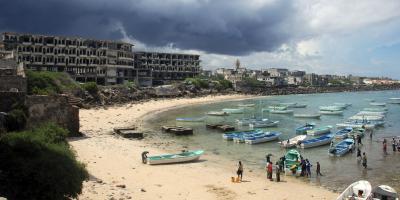
A country previously described as ‘the world’s most failed state,’ Somalia has yet to shed this image. This week alone has brought reports of a return to piracy in the north of the country, insurgent attacks on African Union troops in the south, and a rise in the need for emergency food aid. President Hassan Sheikh Mohamoud recently suggested that elections due next year might not go ahead, due to security challenges. But away from the headlines, incremental progress is being made. In early August, IDLO held its first training of trainers in Mogadishu. Aimed at judges, prosecutors and advocates (all members of the reborn Somali Bar Association), it was meant to help them assist the Somali justice sector in prosecuting serious crimes. Victoria Harrison Neves spoke to IDLO Somalia Country Director, Adam-Shirwa Jama.
The courts are full of people
Victoria Harrison Neves: IDLO has been in Somalia for over three years now. How have things changed in the meantime?
Adam-Shirwa Jama: When we began work in Somalia in March 2012, the transitional period was ending and the country was moving towards a permanent government. People were hopeful, there was a political process underway. A lot of Somalis living overseas came back to work as civil servants or political activists, and even opened new businesses in Mogadishu. The media continued to focus – and still does – on the negative stories of bombings and terrorist attacks, but there was a sense of exuberance among ordinary Somalis. One of the first steps taken by the new government was to make justice, security and the rule of law a priority. And today, you can see that the courts are full of people, seeking redress through the formal justice system. This wasn’t the case four or five years ago.
VHN: But Somalia remains a tough environment. And there is still a reluctance to use the formal court system.
ASJ: Clearly, there are still challenges to overcome. Deepening the rule of law takes time. We are talking about a country which suffered more than two decades of civil war and, prior to that, more than twenty years of dictatorship. The formal justice system in Somalia remains very fragile, and many Somalis continue to rely on traditional dispute resolution mechanisms.
Too little attention is paid to conflict resolution
VHN: How is IDLO responding?
ASJ: There are two strands to our work in Somalia. First, initiatives around the rule of law in the narrowest sense: strengthening justice institutions; building human capacity so that justice professionals are in a better position to administer justice; and enabling communities to seek redress through access to justice, especially for women and youth. When you look at post-conflict countries or countries in transition, people talk a lot about security in terms of the capacity of the security forces. But, often, too little attention is paid to conflict resolution, social inclusion, peace-building and dialogue – issues that are an integral part of stabilization.
Within a broader rule of law sphere, our second area of work is governance. As part of this, we have been assisting our partners in the drafting, consultation and adoption process of the provisional federal Constitution, and we continue to support them to ensure that the final product – the permanent Constitution – is durable.
VHN: But how does this work affect – or improve – the lives of ordinary people?
ASJ: In many ways. Because, as you point out, the formal justice sector is weak, and even non-existent in some rural areas, our team has been working with traditional elders on the reform of X’eer (or customary law) and increasing their awareness of legal obligations under the provisional constitution and international law. A national strategy on X’eer reform is due to be published in December by the Ministry of Justice’s Traditional Dispute Resolution Unit, whose creation we supported, and to which we continue to provide technical assistance.
We have also been working to strengthen access to justice for survivors of gender-based violence in three regions of Somalia; more specifically, the program looks at the barriers to justice for victims, and provides policy recommendations to the government on tackling these.
IDLO has also been the only institution supporting the re-establishment of the Somali Bar Association, developing a training curriculum for lawyers, as well as a code of conduct for the profession, which had been largely unregulated since the civil war began.
We're an argumentative lot, but people reached agreement
VHN: What are you most proud of?
ASJ: Personally, looking back on the last three-and-a-half years, I am particularly proud of the input IDLO has had in the constitutional process in Somalia, from technical assistance to the facilitation of dialogue between opposing parties, and the inclusion in the Constitution of the ban on female genital mutilation.
VHN: You yourself have a Somali background. Did anything surprise you during this process?
ASJ: I have to admit that I was amazed to see Somalis meet their own six-month deadline for drafting of the Provisional Constitution. We are an argumentative lot – we’ve just had 20-odd years of conflict. I wasn’t sure we could do it. There were heated arguments, people stormed out of discussions… But most importantly, they came back and reached agreement. This was largely down to Somali people’s capacity to sort things out between themselves, but also to the leadership of the constitutional process, with its unmatched appetite for compromise. I believe that was a true achievement for the country, and sets a strong foundation for the future.
Photo: Sadik Gulec. For more information on our work in Somalia, visit http://www.idlo.int/where-we-work/sub-saharan-africa/somalia

